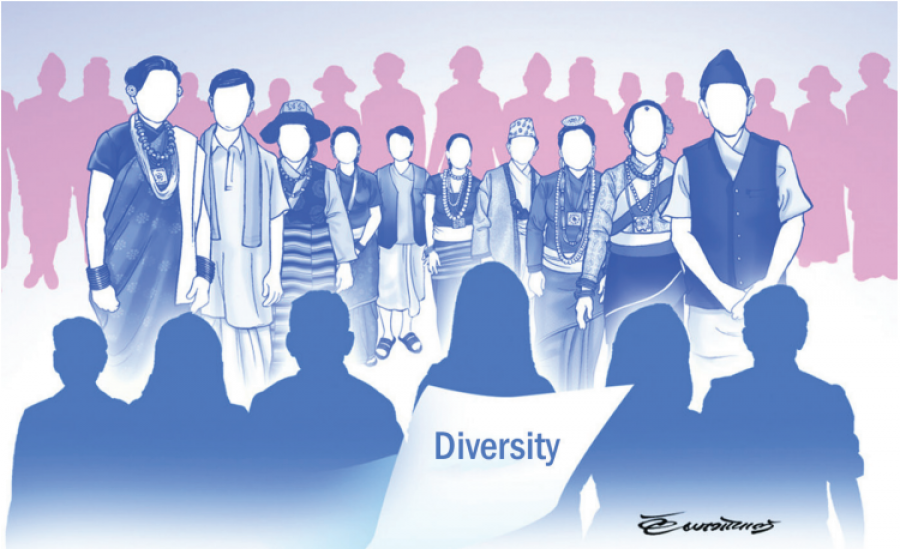National
Inclusion commissions at loggerheads over report
Tharu Commission has objected to the Madheshi Commission’s move to include the surnames of the Tharu people as Madheshis.
Binod Ghimire
The Tharu Commission on Thursday issued a statement saying it objects to the move of the Madheshi Commission to include in its annual report the surnames of Tharu people as Madheshis.
The commission said the act of the Madheshi Commission had jeopardised the identity of the Tharu people.
“The attempts of the governments in the past to list the Tharu people as Madheshis were rejected from the Tharuhat/Tharuwan movements,” reads the statement. “The Tharu Commission objects to the move of the Madheshi Commission to try to identify the Tharu people as Madheshis.”
Bishnu Prasad Chaudhary, chairperson of the Tharu Commission, said several attempts were made in the past to categorise Tharu people as Madheshis despite the community’s reservations.
Chaudhary said a section of the political parties and the political leadership has been trying to establish a narrative that the entire southern belt (Tarai) is Madhesh and people living there are Madheshis.
“The Madheshi Commission too seems to have been guided by the same sentiment,” Chaudhary told the Post. “We firmly stand against it and want the commission to correct its move.”
Officials from the Madheshi Commission, however, accuse the Tharu Commission of kicking up a row. They said the commission hasn’t listed Tharu people under Madheshis in its annual report.
“Nowhere does our annual report mention Tharu people as Madheshis,” Bijay Kumar Datta, chairperson of the Madhesi Commission, told the Post. “Yes, our study report made public last year did so but the Tharu Commission was in the know. I fail to see why the issue has been raised now.”
Though the fourth annual report of the commission doesn’t categorise the surname Tharu as Madheshi, page 10 of the report says there are 149 castes of Madheshis in addition to the Tharus and Muslims that have more than 2,200 surnames.
Chaudhary said unlike in its study report, the Madheshi Commission doesn’t list the surnames of Tharu people as Madheshis in the annual report. However, it clearly says Tharus and Muslims are Madheshis, he said. “Tharus have been put in different clusters in the Constitution of Nepal and several laws. Since they have their own culture and language, they are not Madheshis but a different janajati [indigenous] group,” Chaudhary said. “They [Tharus] don’t entertain any attempts to attack their identity.”
The constitution promulgated in 2015 envisioned seven inclusion commissions to advocate the rights of marginalised and deprived communities. The constitution gives the seven commissions—Madheshi, Dalit, Tharu, Muslim, Women, Indigenous Nationalities, and Inclusion—a 10-year mandate, beginning from the day of constitution promulgation, to work for the empowerment of their respective communities and ensure their participation in socio-political life.
The commissions, however, faced early setbacks. The commissions got their chairpersons and members only after five years. And when the appointments were finally made last year, they courted controversy because they were appointed without parliamentary hearings, a mandatory constitutional provision. Their recommendations were done based on the controversial move of the erstwhile KP Sharma Oli government to amend the Constitutional Council Act. The recommendation and appointment has been challenged in the Supreme Court.
The commissions’ decisions have been mired in controversy while the writ petitions challenging the appointments are sub judice in the court. Human rights experts say the differing views of the two commissions reflect a lack of coordination between them and an overlap of their jurisdiction.
“We have seven inclusion commissions in addition to the National Human Rights Commission (NHRC) for the protection of the rights of the marginalised. That might lead to overlap in jurisdiction,” Bed Bhattarai, former secretary at the NHRC, told the Post. “This problem can only end if the commissions work in close coordination.”
It doesn’t give a positive message when the two constitutional commissions publicly criticise each other, Bhattarai added.




 18.12°C Kathmandu
18.12°C Kathmandu














